Key takeaways:
- Data protection laws, like GDPR and CCPA, vary by region and emphasize the importance of safeguarding personal information while fostering consumer trust.
- Individuals possess specific rights, such as access, rectification, and erasure of their personal data, empowering them in a digital landscape.
- Organizations face challenges in compliance, including the need for employee training and resource constraints, but can implement best practices like data inventory and encryption to enhance protection.
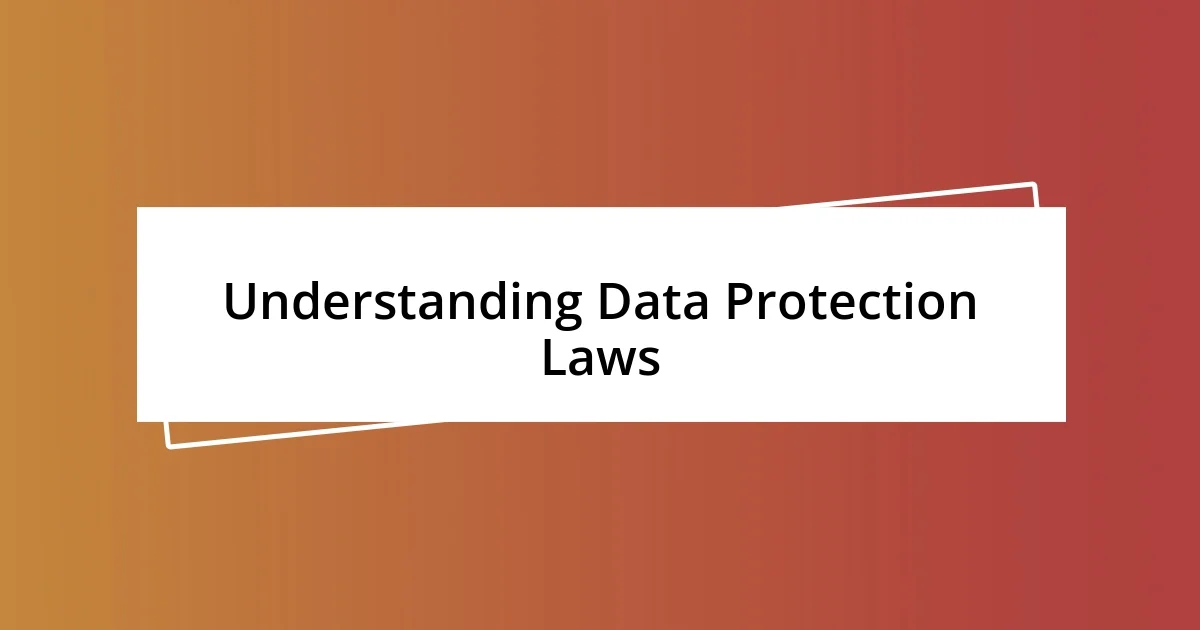
Understanding Data Protection Laws
Data protection laws are designed to safeguard individuals’ personal information from misuse and data breaches. I remember the first time I had to navigate these laws for my own business. It was both overwhelming and eye-opening; understanding the ins and outs of compliance truly made me appreciate the importance of protecting customer data.
These laws can vary significantly from one region to another, like how the General Data Protection Regulation (GDPR) in Europe sets stringent requirements compared to other jurisdictions. I often wonder—how do businesses keep up with these changes? From my experience, staying informed and proactive in terms of compliance not only protects your customers but also builds their trust.
Moreover, the emotional aspect of data protection cannot be understated. Imagine receiving news about a data breach and realizing your personal information is at risk. That feeling of vulnerability can be distressing. Therefore, being well-versed in data protection laws isn’t just about legalities; it’s about safeguarding people’s privacy and instilling confidence in your brand.
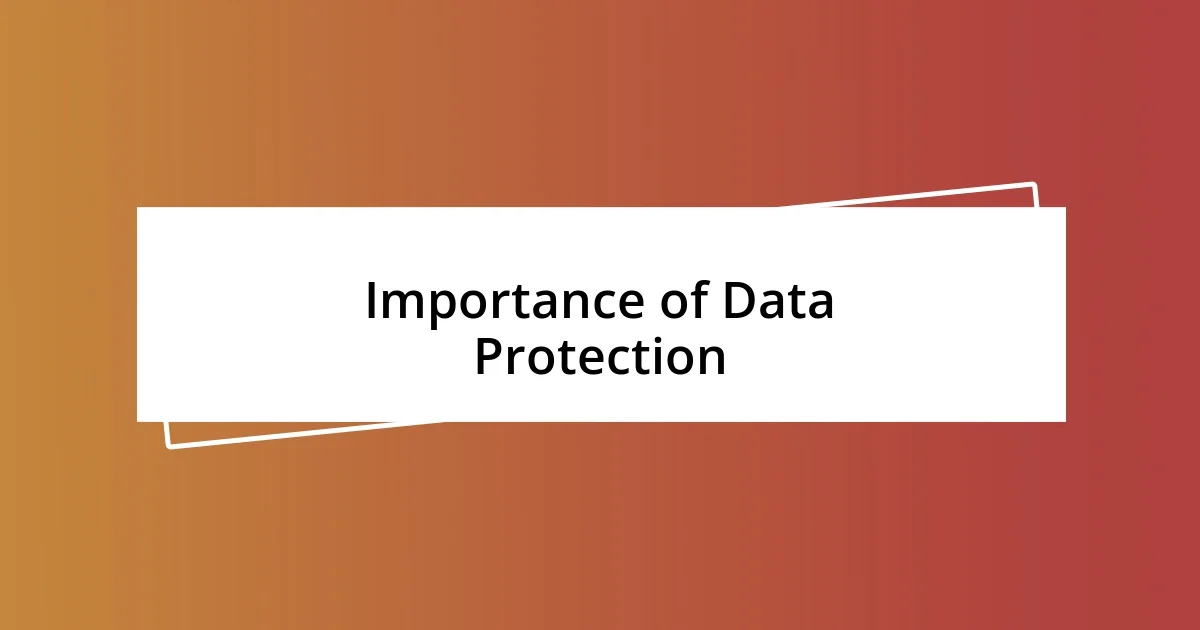
Importance of Data Protection
The importance of data protection cannot be overstated, especially in a world where personal information is exchanged at lightning speed. I vividly recall a moment when a close friend had her details compromised in a major data breach. The anxiety she experienced was palpable; it struck me that data protection is not just a legal obligation but a moral responsibility. Protecting personal data reinforces the trust that customers place in businesses, and that trust, as I’ve seen, is crucial for long-lasting relationships.
Here are a few key reasons why data protection is essential:
- Building Trust: Consumers are more likely to engage with brands that prioritize their privacy.
- Preventing Financial Loss: Data breaches often result in hefty fines and loss of revenue, something I’ve witnessed firsthand in the industry.
- Enhancing Reputation: Companies known for strong data protection practices can stand out in a crowded market.
- Legal Compliance: Adhering to data protection laws helps avoid legal ramifications that could damage a company’s credibility.
Understanding these facets deepens my appreciation for the role effective data protection plays in our digital landscape.
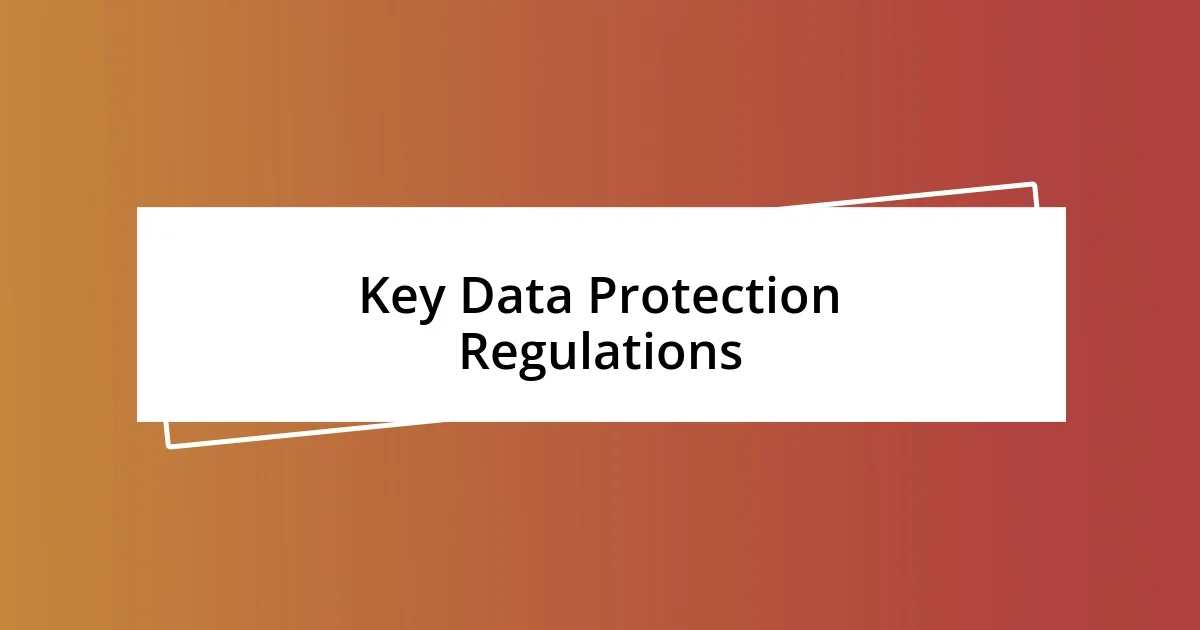
Key Data Protection Regulations
The landscape of data protection regulations is constantly evolving, reflecting society’s growing concern for privacy. For instance, the GDPR has set a standard that many countries now aspire to emulate. I remember attending a seminar where a data security expert passionately discussed how these regulations are not just legal frameworks but essential tools for empowering individuals and enhancing accountability among businesses.
On the other side of the Atlantic, the CCPA (California Consumer Privacy Act) offers a contrasting approach. While the GDPR focuses on rigorous consent and transparency, the CCPA emphasizes consumer rights to access and delete their information. I often think back to a workshop I led, where we discussed how navigating these different regulations can be daunting. My colleagues and I agreed that understanding the nuances of both laws is vital for any business operating in multiple jurisdictions.
Lastly, a recent amendment to the Personal Data Protection Bill in India has sparked considerable interest. This legislation aims to create a comprehensive regulatory framework similar to the GDPR. Witnessing the excitement in the room while discussing potential impacts on local businesses reminded me how critical these regulations are in fostering digital trust and safeguarding consumer rights. It’s fascinating to see how different regions address data privacy while still striving for a common goal—protecting individuals in an increasingly digital world.
| Regulation | Region | Main Focus |
|---|---|---|
| GDPR | Europe | Data protection, consent, and individual rights |
| CCPA | California, USA | Consumer rights to access and delete personal information |
| Personal Data Protection Bill | India | Comprehensive regulation for data privacy |
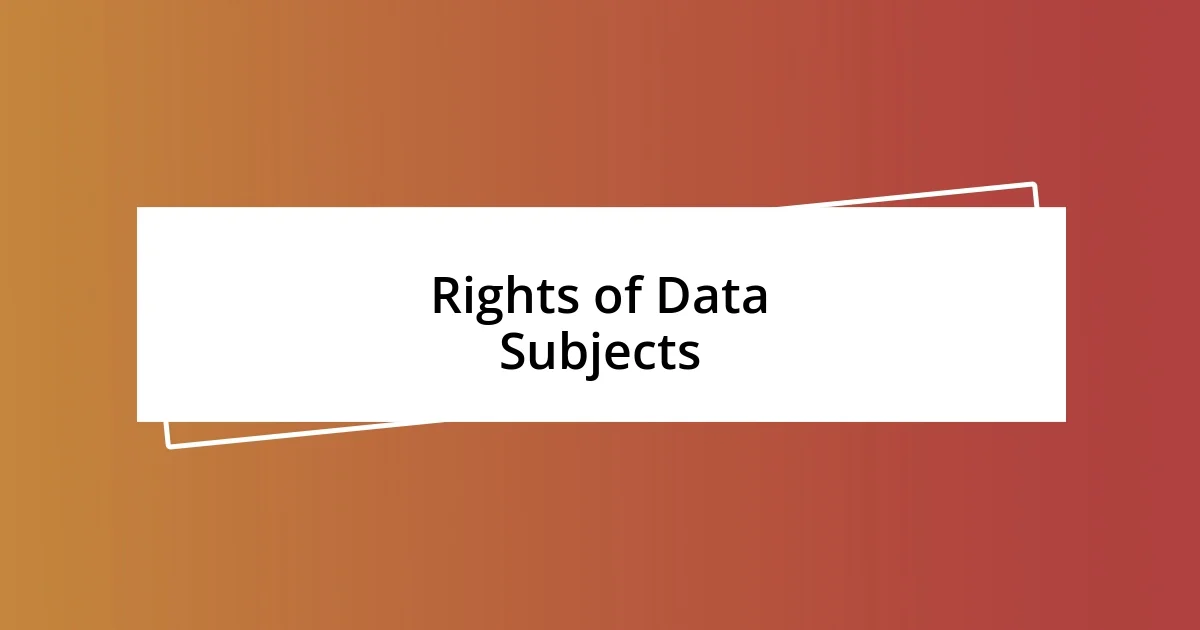
Rights of Data Subjects
Data subjects, as individuals whose personal data is collected or processed, possess essential rights that empower them in the digital landscape. I recall a conversation with a friend who was astounded to learn she had the right to access the data a company held about her. This sense of control can be incredibly liberating, especially knowing that individuals can request information about how and why their data is utilized.
One crucial right is the ability to rectify personal data that may be inaccurate or incomplete. I remember working with a client who discovered an error in their billing information, which could have led to significant issues down the line. It was satisfying to guide them through the process of rectifying that data, highlighting how these rights not only protect individuals but also help organizations maintain accurate and reliable information.
Moreover, the right to erasure, often referred to as the “right to be forgotten,” is particularly poignant. I once encountered a situation where someone wanted to remove their data from a service they no longer used. This resonated with me because it reflects the broader notion that personal data is indeed personal. Why should anyone be forced to carry remnants of their digital past? Empowering individuals with the right to delete their data fosters a sense of ownership and respect in a world where their information is often treated as mere commodities.
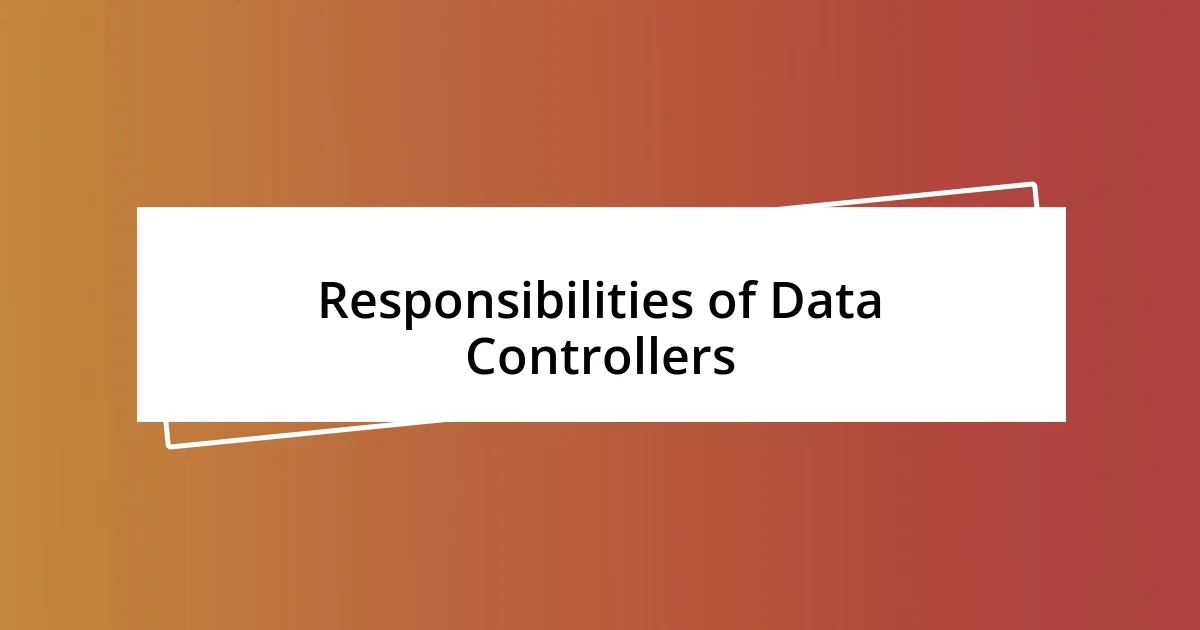
Responsibilities of Data Controllers
Data controllers play a pivotal role in ensuring compliance with data protection laws. From my experience, their primary responsibility is to handle personal data in a manner that respects individuals’ rights and adheres to the legal frameworks in place. I recall a situation where a small business owner was overwhelmed by the requirements of GDPR but was relieved to learn that establishing robust data management practices could not only guarantee compliance but also build trust with their customers.
Another critical duty of data controllers is implementing appropriate security measures to protect personal data from breaches. I once assisted a nonprofit that experienced a data leak, leading to significant reputational damage. It was a stark reminder that neglecting data security can have serious consequences, not just legally but also in terms of public trust. This highlights how data controllers must regularly assess and enhance their security protocols to safeguard sensitive information.
Finally, data controllers are expected to facilitate transparency by informing data subjects about their rights and how their data is processed. I remember a workshop where a participant voiced frustration over not fully understanding how her data was used by a service. This moment drove home the importance of clear communication; when data controllers actively provide this information, they empower individuals and foster a culture of accountability. Isn’t it crucial that we make data practices as transparent as possible, allowing individuals to feel informed and confident in how their data is handled?
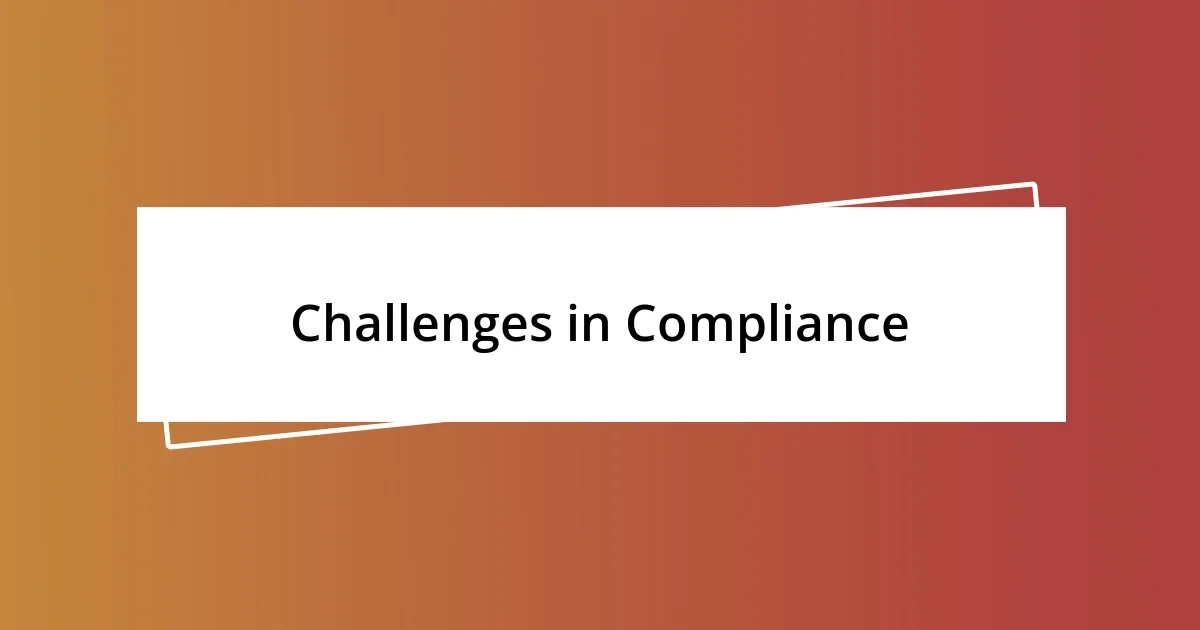
Challenges in Compliance
It’s no secret that navigating compliance with data protection laws can feel overwhelming for many organizations. I remember a conversation with a compliance officer who shared her struggle with keeping up with ever-changing regulations. It prompted me to reflect on how challenging it is to implement new policies across various departments when everyone is already juggling their own responsibilities. How can an organization effectively ensure compliance when the rules keep evolving?
One significant challenge is the need for comprehensive training across the entire workforce. I once attended a workshop where employees were baffled by what “data minimization” really meant in practice. It struck me that the lack of clarity around such concepts can lead to inadvertent breaches. How do we shift the culture to foster a true understanding of these laws among all team members? Without proper training, even well-intentioned actions could lead to compliance failures.
Moreover, small companies often face resource constraints that make compliance particularly daunting. I worked with a startup that lacked the budget for legal advisors and struggled to interpret the laws. This situation reinforced my belief that many businesses may unknowingly fall into non-compliance simply due to a lack of accessible resources. Wouldn’t it be beneficial if there were more support systems available for these growing companies to navigate the complexities of data protection?
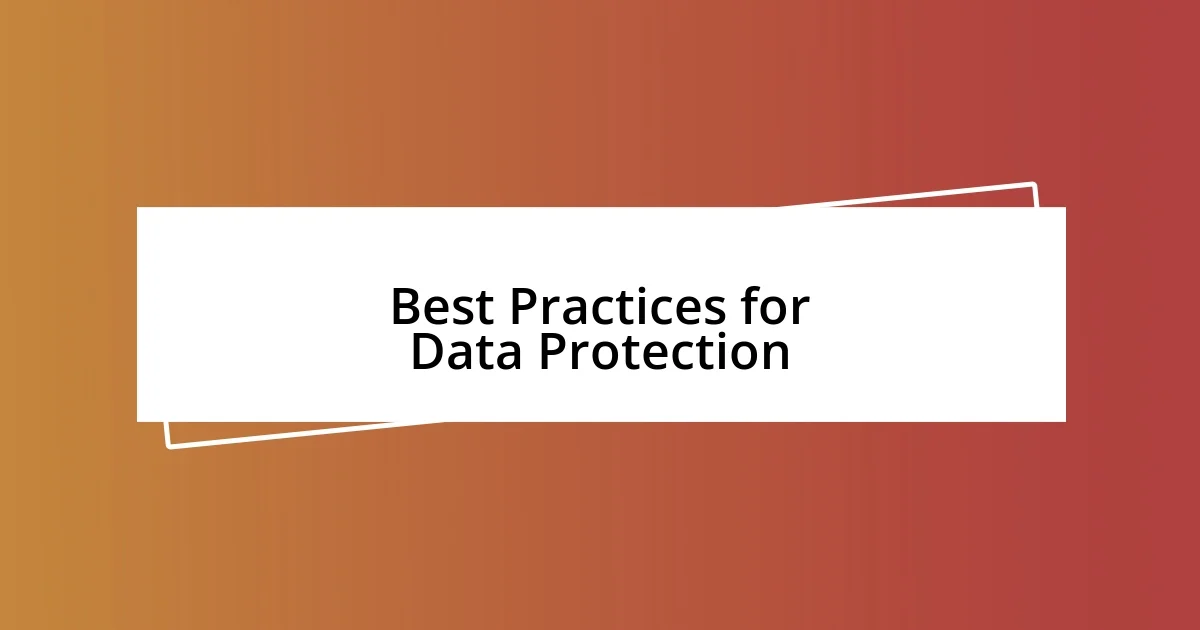
Best Practices for Data Protection
Best practices for data protection start with a solid understanding of the data you collect and process. I once encountered a company that successfully implemented a robust data inventory system. They categorized their data based on sensitivity, which not only improved their security measures but also made compliance audits much smoother. Don’t you think that knowing exactly what data you have is the first step toward effective protection?
Next, encryption stands out as a crucial best practice. I remember advising a friend who runs an online store; he was initially hesitant about encryption due to the perceived complexity. However, once he embraced it, he realized how it served as a strong barrier against data breaches. Isn’t it reassuring to know that even if data is intercepted, it remains unreadable without the proper encryption keys?
Regular audits and assessments are essential to maintaining data protection standards. In my previous experience working with an organization, conducting internal audits revealed gaps in our data handling practices that we had overlooked. It was eye-opening and emphasized the importance of regularly revisiting our security measures. How often do we take a step back to assess our practices and ensure we’re still aligned with best practices? Regular checks not only keep us compliant but also reinforce a culture of accountability throughout the organization.














